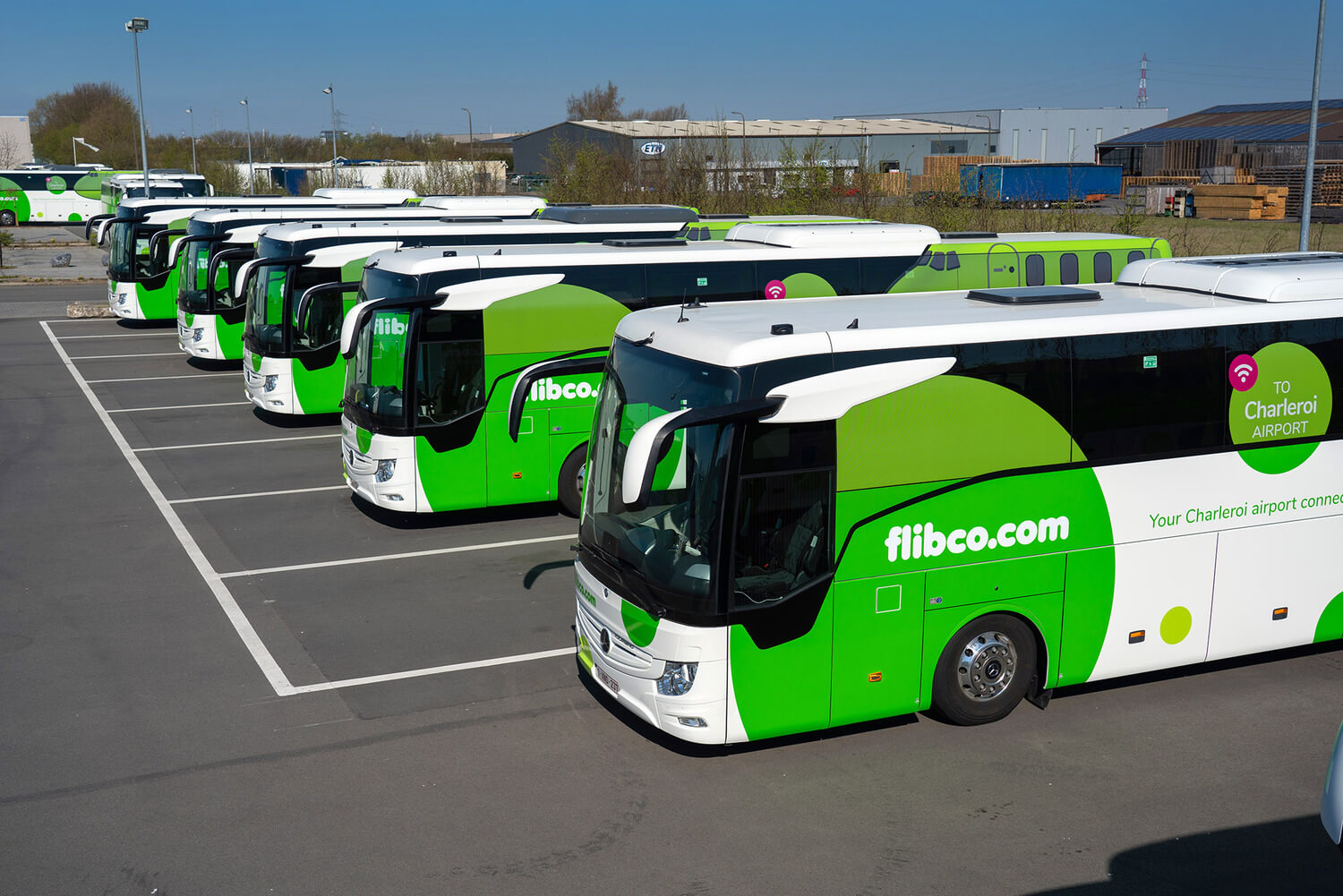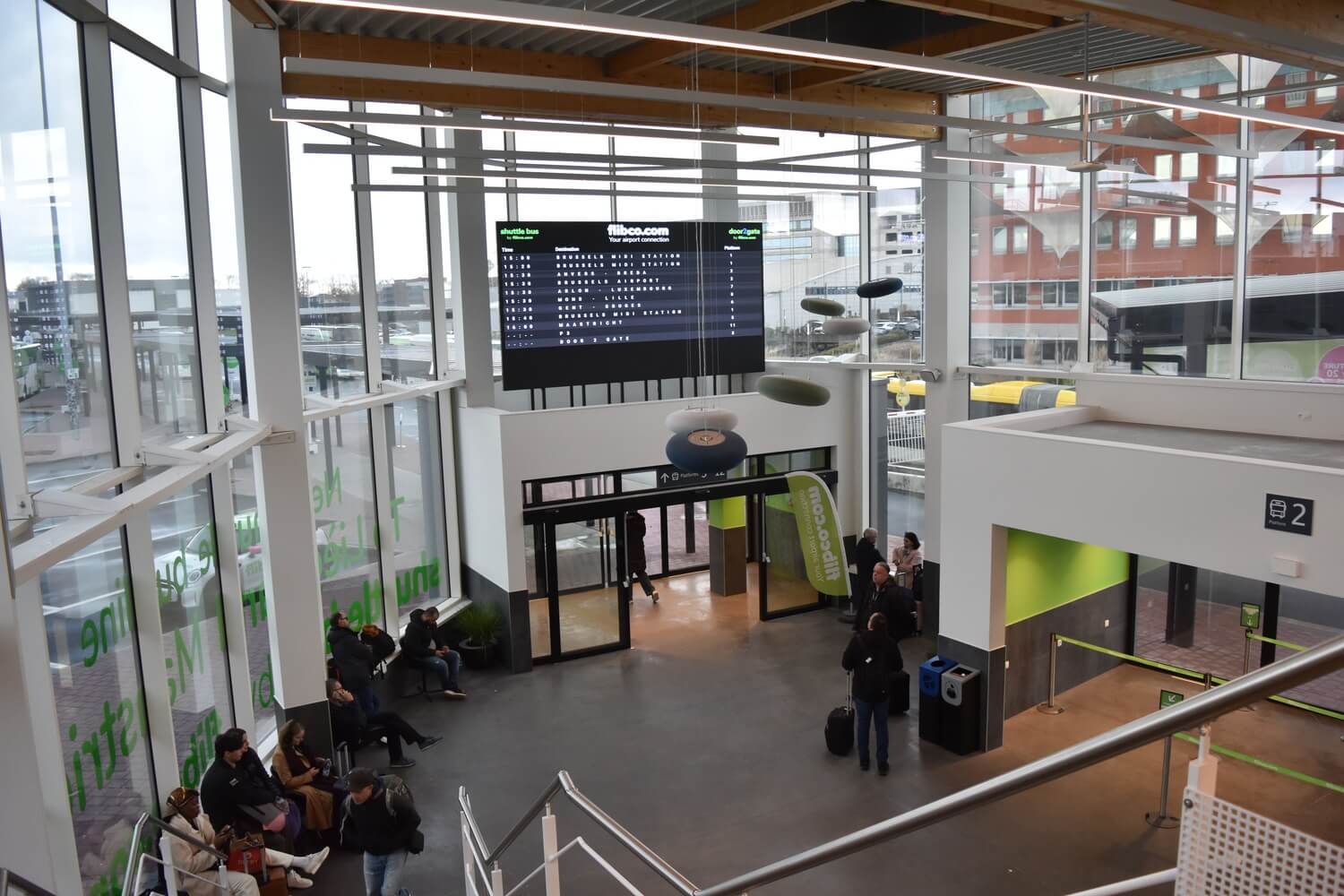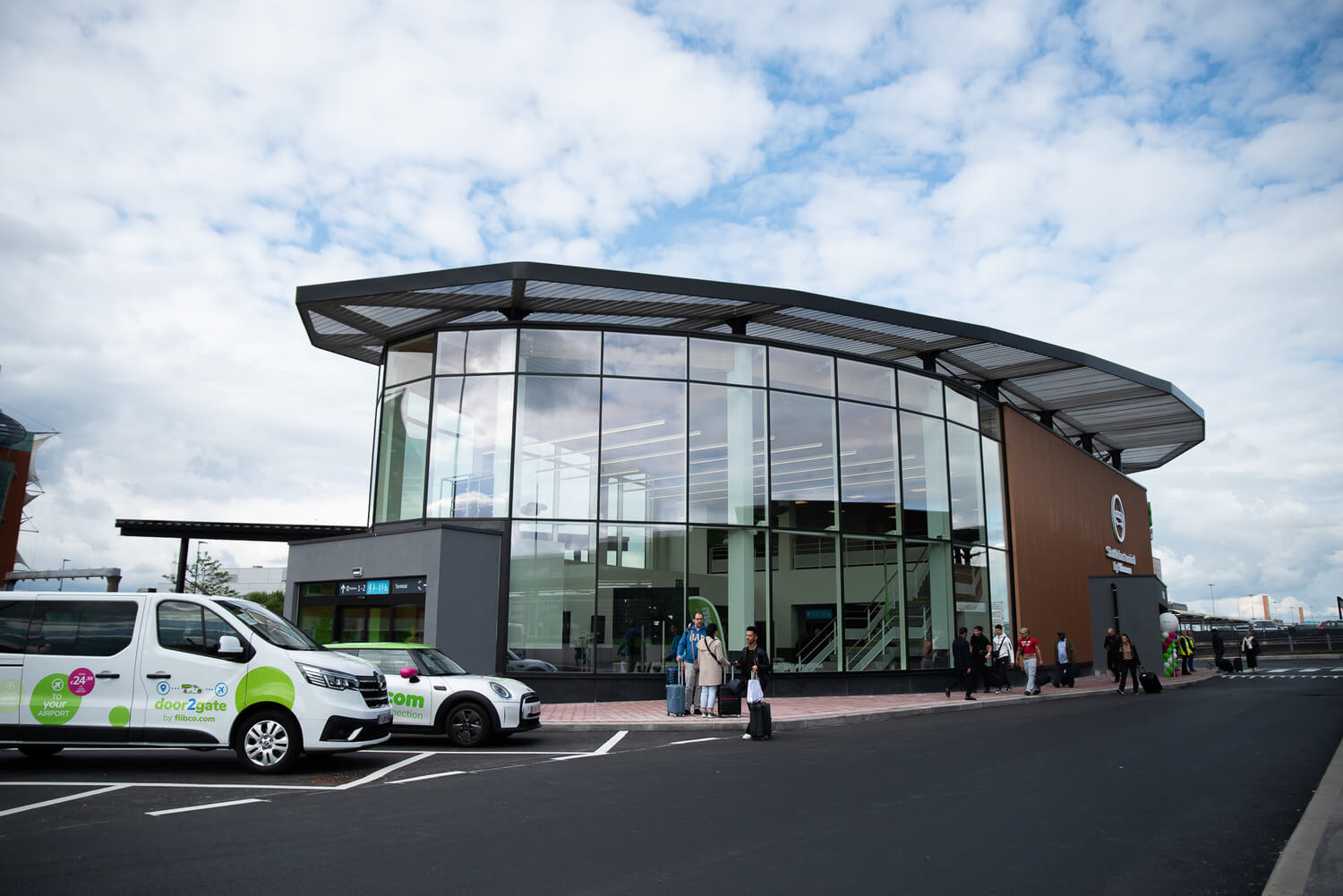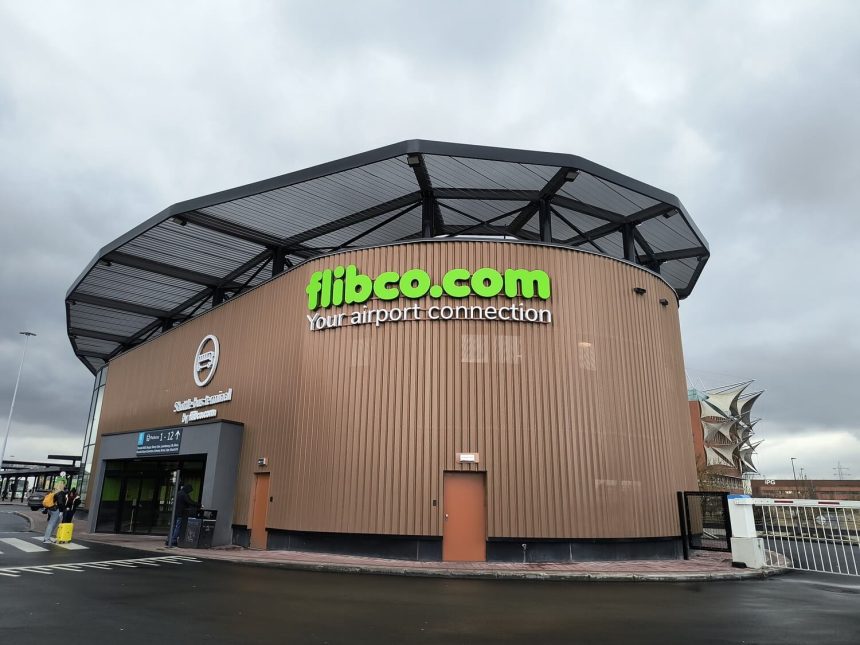Flibco, which will launch in the UK on 1 April by offering a Stansted Airport-London service, has major plans for expansion in this country and is confident its powerful data-led approach will quickly establish it as Europe’s leading airport transfer provider.
Specialising in what it calls the “old-fashioned world” of airport transfers, the Luxembourg-based tech company is threatening a shake-up in this field. Much like Flix, it owns no coaches, and it contracts operators to provide the services in Flibco-branded vehicles. It focuses instead on infrastructure, data systems, websites, marketing and timetabling.
A visit to Brussels South Charleroi Airport shows what Flibco has in mind for the UK and elsewhere in Europe. It is the exclusive shuttle provider for Belgium’s second busiest airport and has a 12-bay transport hub just metres from one of the terminals. It carries 25% of the airport’s 10 million yearly customers to and from nine destinations via about 450 services per day.
Flibco, which is part of the Sales-Lentz Group — the largest private coach and bus operator in Luxembourg — gained a five-year contract with Stansted owner Manchester Airports Group.
It will thus replace Italian-based Airport Bus Express in going head to head with National Express.
It has contracted The Coach Travel Group to provide half-hourly services to and from the UK’s fourth busiest airport, stopping at Stratford and Liverpool Street.
Data is key for Flibco
Flibco was founded in 2005 and now it operates from 14 airports in Italy, France, Belgium, Germany and Hungary.
Its business model is based on using AI and advanced data processing to enhance timetabling and boost efficiency, as well as being able to perform things such as marketing and ticket sales to a level out of reach of coach operators in general.
This “magic behind the scenes”, as Flibco terms it, is what makes the business stand out. The data-led approach enables timetables to be set more appropriately, meaning neither too many nor too few services.
Demand can be forecast on the basis of how many passengers will arrive, which flights are landing and departing and to and from where, and which flights will carry more baggage than others.
“All this allows us to focus quite precisely how many people will need transport when, and thus when we will need double-deckers,” says Paul De Muynck, Country Director for Belgium, where Flibco has transported 12.2 million passengers since arriving there in 2010.

Flibco works closely with the operators in forming the timetables and sharing performance data with them, as well as providing a complete set of digital tools to manage the operation, such as a driver application to, for example, scan tickets.
CEO Tobias Stüber describes how he believes Flibco offers something completely different: “What you see at Charleroi is a model of how we are redefining the niche of airport transportation. Across Europe, airport transportation is very old-school.
“It’s not data-driven nor user-friendly for customers.” He says passenger stress levels are high when it comes to getting to and from the airport, given the vast number of options, adding: “We jump in here with data-driven solutions to make the customer experience a good one.”
He adds: “This is, for me, the future in every form of transportation but especially in this old world of airport transportation.” The traditional business in this sphere is “years behind” in terms of efficiency, he claims.
Across Europe, airport transportation is very old-school. It’s not data-driven nor user-friendly – Tobias Stüber
Flibco’s approach results in a trusted brand, says the business — one that will either be already known to travellers from different parts of Europe seeking to book trips by air or will come up highly on web searches for those seeking flight add-ons.
The stats show success with more than four million passengers carried across its European operations in 2024. Numbers bounced back strongly from the pandemic with 2022 outperforming 2019.
The business, which reports a 98% customer satisfaction rate, believes this expansion is not just due to the growth of Ryanair and the like as market share is also increasing.
“We see huge potential to change this market and it’s a growing market,” says Tobias.
Flibco will use Charleroi hub as the template
While the data behind the scenes is crucial to Flibco’s model, the infrastructure set-up in Charleroi is seen as important too. As Paul explains: “In the beginning it was just a tent, and it was a really bad experience for passengers.”
Seeing the need for a long contract in order to justify the necessary investment, Flibco secured with the airport a 12-year deal — since extended to 15 years due to the pandemic. Flibco invested £4 million in the new hub, which was completed in June 2024.
Paul says: “We have shown the airport that we can really improve the accessibility and reach of the airport.” The three-part goal, which he says is being achieved, has been to make the airport more accessible within a catchment area, to extend the catchment area and to improve the customer experience.
Flibco’s success in Charleroi is boosted by the fact that the airport has no railway station, which helps explain why the market share is more than three times higher there than across Belgium in general, where 7.2% of passengers at the airports where it is based use its coaches.
However, as Paul points out, coach is a much cheaper option for local authorities and airports than rail and carries the advantages of flexibility when it comes to, for example, trying new routes.

The business uses one main coach operator to supply 42 coaches in Charleroi plus other partners for peak times.
Flibco branding hits passengers as soon as they arrive in the baggage reclaim area and there is a sales and customer information desk when they step outside the building. The target is continuity and passenger flow. According to Tobias, airports have been working hard to regain customers since COVID and improving the ongoing and incoming connection experience is very much part of that.
“The airports are seeing it as very important that, in front of the airport at the coach bay, it’s like on the airside and everything should be structured,” he says.
To that end, the departure boards at the hub are in the style of the airport boards and Flibco is working with the airport to provide live flight info on display boards on the coaches.
Flibco has big plans for UK
The launch into the UK is a logical one, according to Tobias, who says: “UK is for us a great market. Stansted currently has over 28 million passengers a year and the airport wants to grow in future years. We want to grow with it, we want to be a key player in front of the airport to help it grow.
“What we will do in the second step is try to see where we can enlarge the catchment area, and bring more people to this airport.”
Flibco, which has 70 new lines in the pipeline across Europe, is in discussions with Luton and Manchester airports to operate from there and has a vision to grow further than that in the UK.

It will also consider replicating the Charleroi approach here, setting up transport hubs as exclusive transport providers of the airports — as long as airport owners can be convinced to contract for sufficiently long enough, of course. “In the next two years or so, we want it to be so everyone in the UK knows Flibco.”
In 2019, Flibco launched Door2Gate in Belgium, a “last mile” minibus service designed to be cheaper than a taxi as it is shared use.
Introduction of that in the UK is possible at some point, says the CEO, although it is still in “testing mode” and the business is keen not to risk scaling it up too quickly.
Operator satisfaction
Flibco says its appearance on the UK scene will boost operators’ fortunes. Tobias stresses: “All the partner coach operators we have across Europe are happy. They do not see us as something dangerous because we create ‘win win win’ situations. Win for us, win for the airport, and win for the operator.
“We’re not stealing the jobs of UK people. It’s the opposite. We’re coming to make the business efficient and sustainable so that we guarantee jobs over the years to come.”
We create ‘win win win’ situations. Win for us, win for the airport, and win for the operator – Tobias Stüber
Larger and small operators can benefit, he adds. “If we have three small operators which like what they are doing and follow our data approach and do an excellent job, it’s the same as having one big operator,” he says.
“When we talk about operators, it’s not only the size, it’s the quality and the passion they have for their field of expertise.”
Among Flibco’s goals is changing the image of coach travel. “Our DNA is coach,” says Tobias. “Coach in general has a negative image, but it’s part of our mission to change that.
“You have nice, comfortable coaches and you are helping the climate, we have wi-fi and you can work on board. There are so many advantages, and I think people are realising that, especially Generation Z.”



























